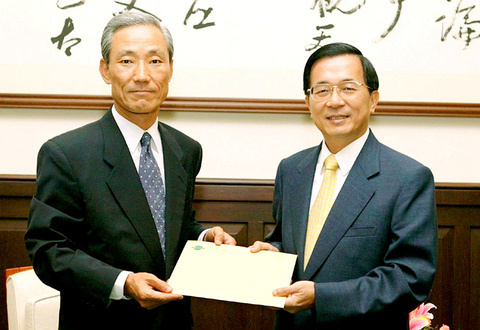President Chen Shui-bian (
"Although it is not satisfactory [to attend as `Chinese Taipei'], we will respect it, since it was the tacit understanding that was originally established," Chen said.
In October 1991, both China and Taiwan signed memorandums of understanding with South Korea, and Taiwan agreed to enter APEC under the name of "Chinese Taipei." Taiwan entered APEC in Seoul in 1991 along with China and Hong Kong.

PHOTO: AFP
But Beijing has repeatedly blocked Taiwan's presidents and foreign ministers from attending the annual forums. As a result, the president must always appoint an envoy to go on his behalf.
"If I were able to attend this year's summit, I would respect the agreement that was originally established and not challenge the title issue," he said.
He said China should have no reason to object to Taiwan attending the meeting as "Chinese Taipei."
Chen made the remarks as he received Kim Jong-hoon, an envoy sent by South Korean President Roh Moo-hyun to deliver an invitation to Chen to attend the APEC leaders' summit in Pusan.
Some 6,000 leaders and officials from 21 APEC countries are expected to take part in the Nov. 18-19 meeting.
Chen told Kim that the summit should be a venue for talks between Taiwan and China's leaders.
Chinese President Hu Jintao (
Chen said it is the international community's expectation that both sides of the Taiwan Strait engage in dialogue and reconcile.
"The APEC leaders' summit is not a political setting. It is the best platform to discuss regional economic cooperation, and a suitable place to let the leaders of the two sides make contact and hold discussions," Chen said.
Taiwanese leaders should not be excluded from the annual summit, as the country, like all other APEC members, is entitled to enjoy its rights and assume its obligations in the organization, he said.
Noting that South Korea had written history in 1991 with its shuttle diplomacy between Taipei and Beijing to negotiate APEC membership, Chen said he hoped "the APEC leaders' summit to be hosted by South Korea this time could write history again."
"I hope President Roh Moo-hyun can help me attend this year's APEC summit in Pusan," he said.
Meanwhile, officials are hedging their bets on Chen's chances of actually attending the summit.
"Numerous factors will impact whether [Chen's participation] will be realized," said an official who wished to remain anonymous. "We will try our best."
The name "Chinese Taipei" was accepted because it offered ample room for interpretation by both Taipei and Beijing. China calls Taipei "Chung-kuo Taipei" (中國台北) since "Chung-ku" is the Mandarin abbreviation for the People's Republic of China, and this address satisfies Beijing's need to proclaim that Taiwan is a part of China. Taiwan calls itself "Chung-hua Taipei" (中華台北), because "Chung-hua" is the abbreviation for the Republic of China.
also see story
Editorial: What's Chen up to this time?

Taiwan yesterday denied Chinese allegations that its military was behind a cyberattack on a technology company in Guangzhou, after city authorities issued warrants for 20 suspects. The Guangzhou Municipal Public Security Bureau earlier yesterday issued warrants for 20 people it identified as members of the Information, Communications and Electronic Force Command (ICEFCOM). The bureau alleged they were behind a May 20 cyberattack targeting the backend system of a self-service facility at the company. “ICEFCOM, under Taiwan’s ruling Democratic Progressive Party, directed the illegal attack,” the warrant says. The bureau placed a bounty of 10,000 yuan (US$1,392) on each of the 20 people named in

The High Court yesterday found a New Taipei City woman guilty of charges related to helping Beijing secure surrender agreements from military service members. Lee Huei-hsin (李慧馨) was sentenced to six years and eight months in prison for breaching the National Security Act (國家安全法), making illegal compacts with government employees and bribery, the court said. The verdict is final. Lee, the manager of a temple in the city’s Lujhou District (蘆洲), was accused of arranging for eight service members to make surrender pledges to the Chinese People’s Liberation Army in exchange for money, the court said. The pledges, which required them to provide identification

Nine retired generals from Taiwan, Japan and the US have been invited to participate in a tabletop exercise hosted by the Taipei School of Economics and Political Science Foundation tomorrow and Wednesday that simulates a potential Chinese invasion of Taiwan in 2030, the foundation said yesterday. The five retired Taiwanese generals would include retired admiral Lee Hsi-min (李喜明), joined by retired US Navy admiral Michael Mullen and former chief of staff of the Japan Self-Defense Forces general Shigeru Iwasaki, it said. The simulation aims to offer strategic insights into regional security and peace in the Taiwan Strait, it added. Foundation chair Huang Huang-hsiung

’DISTORTION’: Beijing’s assertion that the US agreed with its position on Taiwan is a recurring tactic it uses to falsely reinforce its sovereignty claims, MOFA said The Ministry of Foreign Affairs (MOFA) yesterday said Chinese state media deliberately distorted Taiwan’s sovereign status, following reports that US President Donald Trump agreed to uphold the “one China” policy in a phone call with Chinese President Xi Jinping (習近平). During the more than one-hour-long call, Xi urged Trump to retreat from trade measures that roiled the global economy and cautioned him against threatening steps on Taiwan, a Chinese government summary of the call said. China’s official Xinhua news agency quoted Xi as saying that the US should handle the Taiwan issue cautiously and avoid the two countries being drawn into dangerous